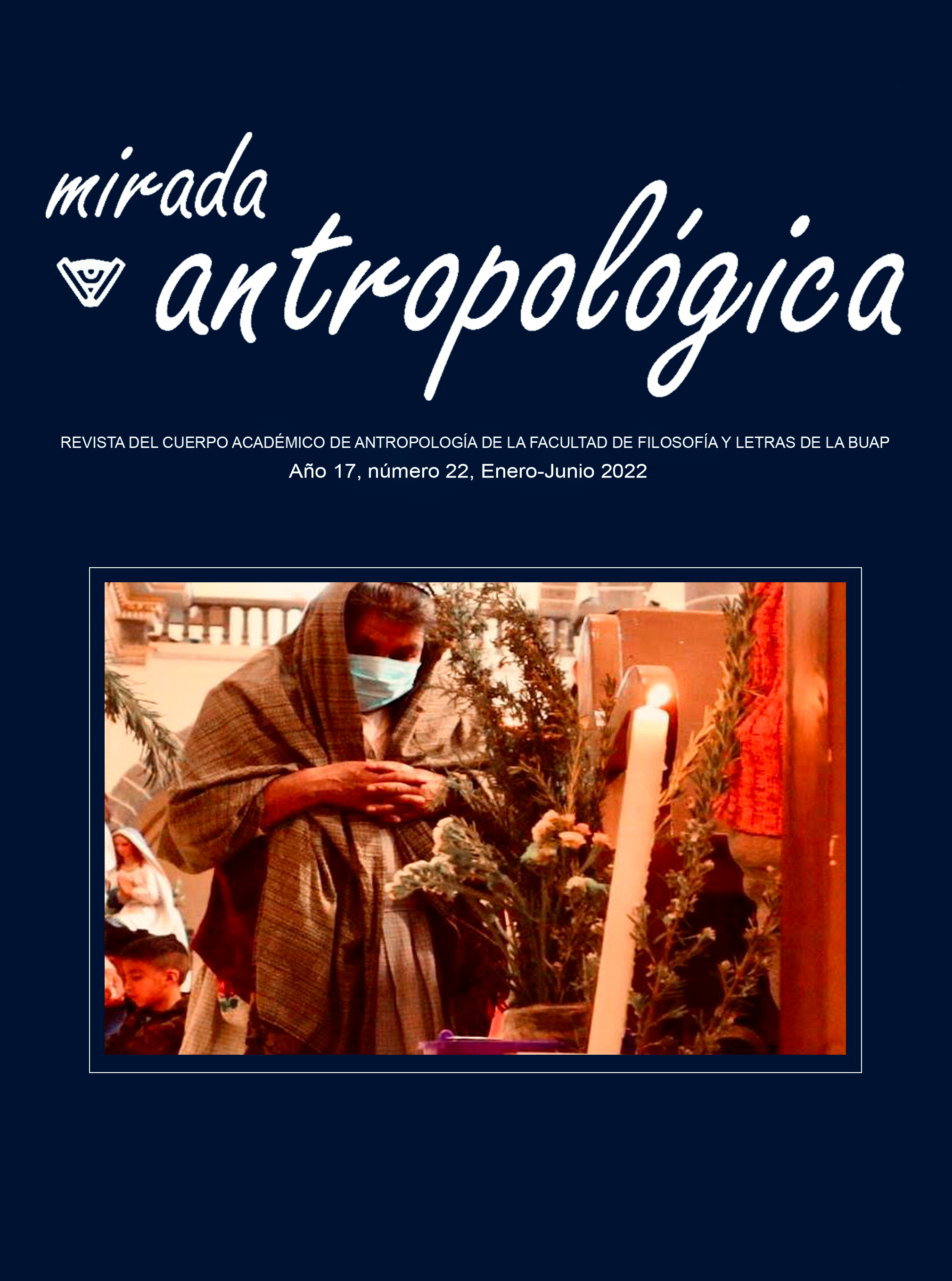The Playful Loss of the Religious Festival and its Symbolic-Digital Reconfiguration in the Face of COVID-19 in Cholula, Puebla
Abstract
This work analyzes two social processes, the playful loss of the religious festival and its symbolic-virtual reconfiguration on digital platforms in the neighborhoods of San Pedro Cholula, as a result of the structural changes caused by a critical event. The text seeks to contribute to the anthropological reflection on the phenomena that are part of the networks of destructuring and symbolic-cultural reboration of the socio-religious life of the urban peoples of the country as a result of the impact of the COVID-19 pandemic. Methodologically, this research was based on face-to-face and digital ethnographic fieldwork.
References
Beyer, J. (23/03/2020). On being voices of prudence in times of a pandemic – #corona. Allegra lab, Disponible en: https://allegralaboratory.net/on-being-voices-of-prudence-in-times-ofa-pandemic-corona/
Bonfil Batalla, G. (1973). Cholula la Ciudad Sagrada en la Era Industrial. México: Universidad Nacional Autónoma de México.
Caro Baroja, J. (1984). El Estilo festivo, fiestas populares del verano. Madrid: Taurus.
Cruces Villalobos, F. (1999). Notas sobre la problemática del concepto de ritual en el estudio de las sociedades contemporáneas. En S. Rodríguez Becerra (compilador). II Congreso de religiosidad popular (pp. 513-529) Sevilla: Consejería de Cultura; Fundación Machado.
Cortés-Meda, A., & Ponciano-Rodríguez, G. (2021). Impacto de los determinantes sociales de la COVID-19 en México. Boletín sobre Covid-19 Vol.2, No. 17, pp. 9-13.
Das, V. (1995). Critical Events: an anthropological perspective on contemporary India. New Delhi: Oxford University Press.
Dijck, J. V. (2016). La cultura de la conectividad. Una historia crítica de las redes sociales. Buenos Aires: Siglo XXI Editores.
Gámez Espinosa, A. (2017). Cosmovisión sobre los santos en la ciudad dual de Cholula. En A. Gámez Espinosa, R. Ramírez Rodríguez (coords.) Cholula. Ciudad dual, sagrada y cosmopolita (pp. 22-54) Puebla: BUAP. García Canclini, N. (2004). Diferentes, desiguales y desconectados, mapas de la interculturalidad. Barcelona: Ed Gedisa.
Giddens, A. (1993). Consecuencias de la modernidad. 1a. edición. Madrid: Alianza. Giménez, G. (1978). Cultura popular y religión en el Anáhuac. México: Centro de estudios Ecuménicos.
Haraway, D. (2015). Anthropocene, Capitalocene, Plantationocene, Chthulucene: Making Kin. Environmental Humanities, vol. 6, núm. 1, pp. 159- 165.
Juárez Cao, Romero A. (1999). Catolicismo popular y fiesta. Sistema festivo y vida religiosa de un pueblo indígena del Estado de Puebla. México: BUAP.
Licona Valencia, E., Gámez Espinosa A. y Villalobos Sampayo L. (2016). Hacia una Definición Sociocultural Territorial del Valle de Puebla-Tlaxcala. México: BUAP.
Licona Valencia, E., Gámez Espinosa, A., Ramírez Rodríguez, R. (2013). San Miguel Canoa, Pueblo Urbano. México: BUAP.
Lins Ribeiro, G. (2021). “Descotidianizar” el mundo. La pandemia como evento crítico, sus revelaciones y (re) interpretaciones. Desacatos, Revista De Ciencias Sociales, (65), pp. 106– 123.
Neira Marciales, L. (29/08/2020). YouTube, Facebook e Instagram son las plataformas más utilizadas durante la pandemia. La República. Recuperado de: https://www.larepublica. co/internet-economy/youtube-facebook-e-instagram-son-las-plataformas-mas-utilizadas-durante-la-pandemia-3052470
Organización de las Naciones Unidas para la Educación, la Ciencia y la Cultura (Unesco). (2020). Education: From Disruption to Recovery. Disponible en: https://en.unesco.org/covid19/educationresponse.
Olivera, M. (1970). La importancia religiosa de Cholula. (Notas etnográficas). En I. Marquina (coord.) Proyecto Cholula, (pp:211-247). México: INAH.
Reygadas, L. (2018). Dones, falsos dones, intercambios asimétricos y explotación en las redes digitales. Diversidad de la economía cognitiva. Desacatos, núm. 56, pp. 71-89.
Sandford, A. (03/abril/2020). Coronavirus: Half of Humanity Now on Lockdown as 90 Countries Call for Confinement. Euronews. Recuperado de: https://www.euronews. com/2020/04/02/coronavirus-in-europe-spain-s-death-toll-hits-10-000-after-record-950-new-deaths-in-24- hou
Srnicek, N. (2018). Platform capitalism. Cambridge: Polity Press. Tucker, E. (2018). Uber and the unmaking and remaking of taxi capitalisms: Technology, law, and resistance in historical Perspective. En D. McKee, F. Makela, T. Scassa (ed), Law and the “Sharing Economy” (pp.357- 391) Ottawa: University of Ottawa Press.
Wolf, Eric R. (1982). Europe and the People without History. Berkeley: University of California Press.
Copyright (c) 2022 Benemérita Universidad Autónoma de Puebla

This work is licensed under a Creative Commons Attribution-NonCommercial-NoDerivatives 4.0 International License.






